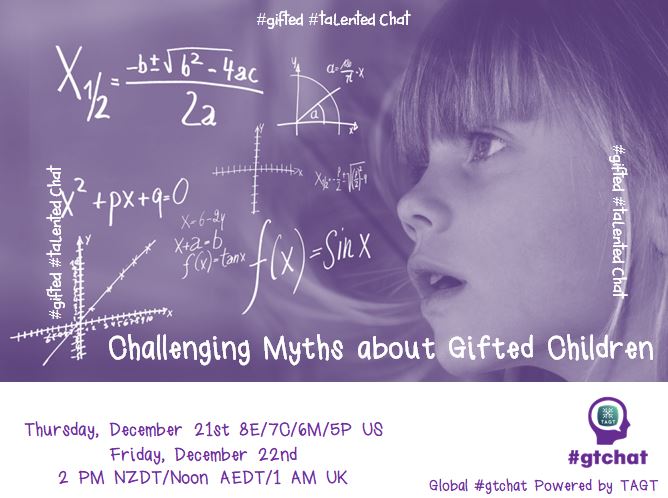
During our last Twitter chat of the year, #gtchat tackled the subject of myths about gifted children and what can be done to challenge them. Myths can have wide-ranging effects on these children; some of which can last a lifetime.
Exactly what are some of these damaging effects? Myths can prevent children from receiving the services they require at school and this can leave them vulnerable, feeling neglected and discouraged, or worse. Myths can also cause unrealistic expectations. Gifted children are usually not gifted in all areas. When adults repeat the myths, young gifted children can believe them and begin to question their own abilities.
Myths can affect teacher’ perception of students labeled ‘gifted’ in the regular classroom. Due to little or no undergraduate classes in gifted education, many teachers lack knowledge about gifted students. Myths too often become perception and this influences interactions with these students. A gifted student may not always be a ‘straight A’ student. Asynchronous development – many ages at once – can complicate their academic life as well. As Justin Sulsky, GT teacher in New York, pointed out, “Myths cause teachers to think that the “wrong” kids are in GT programs and that the “right” kids are not being served. ”
Why does the ‘all children are gifted’ myth still persist? It is particularly disturbing and misleading. Failure to adequately define what ‘gifted’ is and is not perpetuates this myth. The ‘all children are gifted’ myth is often used as an excuse to deny services to this special population of students. A misunderstanding of gifted as meaning ‘better than’ rather than ‘better at’ cause some to view gifted children as elitist. Lisa Aguilar, special education teacher, explained, “I think we want to see the best in all children, that we overdo it and confuse giftedness with strengths. All students have strengths that can be built on, but giftedness is a different way of thinking.”
“The myth that all children are gifted is an attempt to justify whole group instruction. All children may be blessed, unique, and valuable, but their academic, social and emotional needs vary by their ability.” ~ Ellen Williams, Ed.D, consultant and author
Many educators are resistant to accelerating students – what myths cloud their thinking? Not all children will successfully accelerate – many times for reasons that have little or nothing to do with the child’s abilities; but one misstep should not obscure the benefits for students who need it. Acceleration is one of the most researched strategies used for challenging gifted students. Myths persist when decision makers fail to read the research.
“Educators don’t accelerate because: 1. “it’s just not done that way”; 2. It will complicate a child’s trajectory down the road. (e.g. What will they do in 11th grade of HS if they already took the whole math sequences?); and 3. They wrongly worry about student’s social development.” ~ Justin Sulsky
The myth that twice-exceptional students’ disability be addressed before their giftedness is a myth often faced by parents of 2E kids who are required to ‘prove’ their child be seen as gifted first. Currently, researchers are providing exceptional research reported in papers and books. Parents need to share this information with their child’s teachers. (Please see links below.) They need to be vigilant in documenting their child’s progress when challenged and then share it with school officials.
Finally, we discussed the myth that AP classes constitute a gifted program for secondary gifted students. Recently, a few states in the U.S. have recognized that AP classes can be ‘part’ of a rigorous program, but simply do not address all the needs of gifted students and are attempting to change direction. AP classes may address academic needs, but gifted students are a diverse population expressing many different abilities and talents.
For more information, a transcript of this chat may be found at Storify.

Global #gtchat Powered by the Texas Association for the Gifted and Talented is a weekly chat on Twitter. Join us Thursdays at 8E/7C/6M/5P in the U.S. and Fridays at 2 PM NZST/Noon AEST/1 AM UK to discuss current topics in the gifted community and meet experts in the field. Transcripts of our weekly chats can be found at Storify. Our Facebook Page provides information on the chat and news and information regarding the gifted community. Also, checkout our Pinterest Page and Playlist on YouTube.
 About the author: Lisa Conrad is the Moderator of Global #gtchat Powered by TAGT and Social Media Manager of the Global #gtchat Community. She is a longtime advocate for gifted children and also blogs at Gifted Parenting Support. Lisa can be contacted at: gtchatmod@gmail.com
About the author: Lisa Conrad is the Moderator of Global #gtchat Powered by TAGT and Social Media Manager of the Global #gtchat Community. She is a longtime advocate for gifted children and also blogs at Gifted Parenting Support. Lisa can be contacted at: gtchatmod@gmail.com
Links:
TAGT: 5 Myths about Giftedness (pdf – p. 25)
10 Myths about Gifted Students (YouTube 5:13)
The Unique Challenges of Raising a Highly Gifted Child
The Value of Challenging Gifted Students in Elementary School
Differences, Disregarded (Michael Clay Thompson) *response to “all children are gifted”
(AUS) Gifted Education: What is it? Do We Even Need it?
10 Facts You May Not Know about Gifted Children, But Should
Twice-Exceptional Newsletter: What Is Gifted and Why Does It Matter?
7 Myths about Twice-Exceptional (2E) Students
Gifted Children: Myths and Realities (Amazon)
Gifted Children – So Intelligent, But They Struggle
Sprite’s Site: Columbus Cheetah, Myth Buster
Sprite’s Site: Columbus Cheetah, Myth Buster – Myth 2
Sprite’s Site: Columbus Cheetah, Myth Buster – Myth 6
Is it a cheetah? (Stephanie Tolan)
Top Ten Myths if Gifted Education (YouTube 8:10)
Personas, Profiles and Portraits: Facebook 52 Illustrations Challenge July
Gifted Homeschoolers Forum: Are All Children Gifted?
Photo courtesy of Pixabay CC0 Creative Commons
Graphic courtesy of Lisa Conrad

